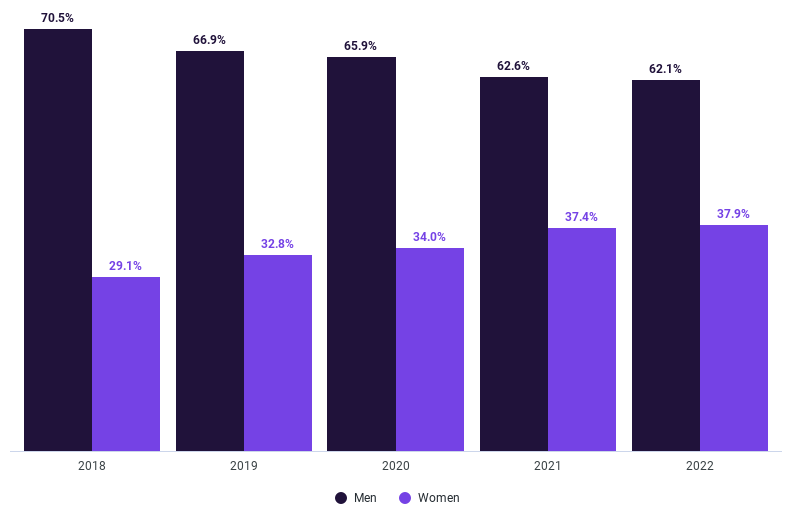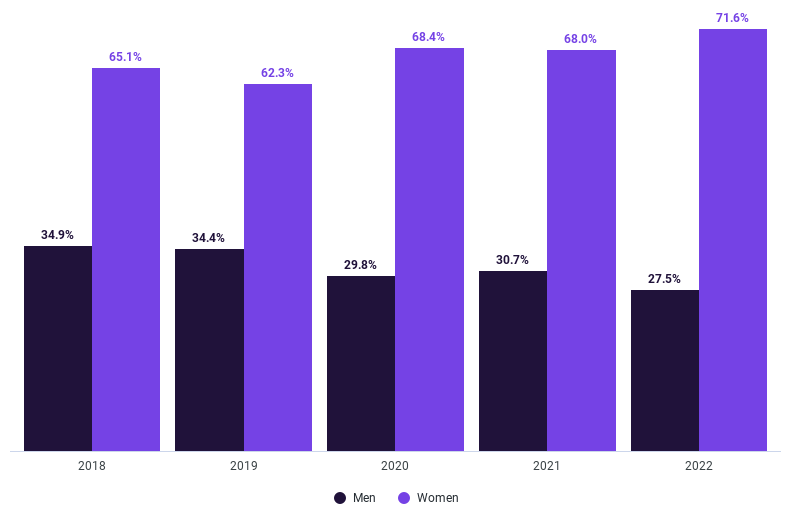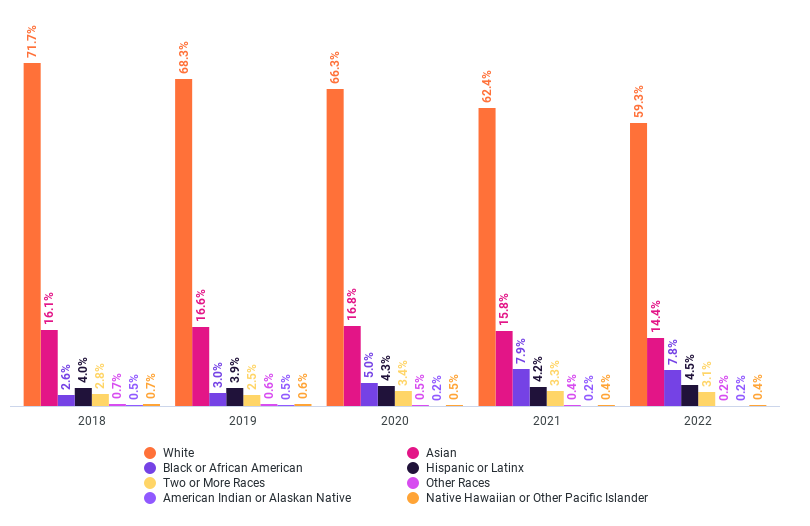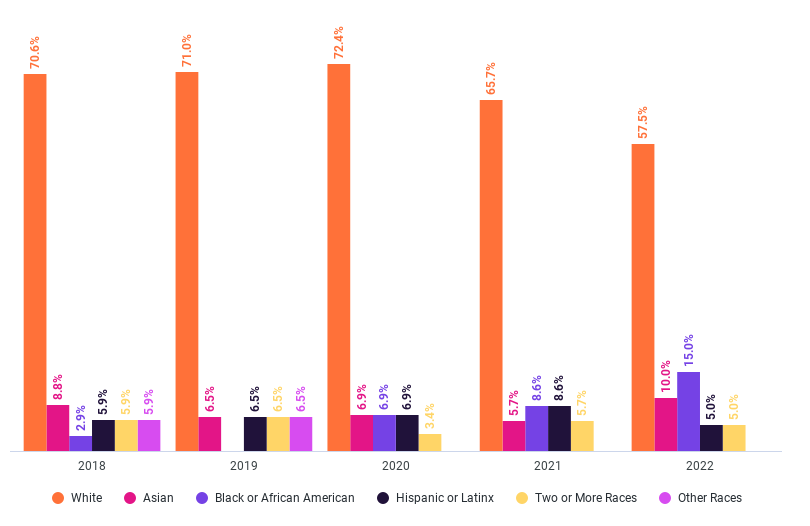Introduction
As a mission-driven organization with employees, volunteers and community members spanning the globe, we strive to continue the journey in our commitment to fostering an equitable and inclusive culture — while also maintaining alignment to our core organizational values of transparency and accountability. We encourage you all to join our movement toward a healthy and inclusive internet.
At Mozilla we operate cohesively under five separate but unified entities: the Foundation (MoFo), Corporation (MoCo), MZLA, Mozilla Ventures, and Mozilla.ai. Our annual disclosure gives us a unified opportunity as ‘One Mozilla’ to both reflect on our ambitious vision of fostering an equitable culture that enables inclusion, and to remain activated in our core organizational values of transparency and accountability around the commitments we’ve made. Historically, we have reported information on the Foundation and Corporation and are aiming to begin including information on our newest entities in future reports. This year's report will continue to focus on the Foundation and Corporation.
In 2022, on the Corporation side, we re-oriented ourselves foundationally and strategically formalized our new Inclusion, Diversity, Equity and Accountability (IDEA) team which sits within our broader Social and Environmental Impact (SEI) team. This created a strategic runway for us to continue building on the momentum from 2021.
Each year we aim to account for our progress and challenges in advancing our commitment to being a diverse, equitable and inclusive organization driven by accountability. This 2023 disclosure captures our progress through 2022. This year, we are pleased to continue providing data that captures the intersectional experiences of our employees in recognition of the complexity of our identities.
Lastly, we acknowledge that the racial and ethnic representation data we’re disclosing is specific to the United States. We are developing better global reporting practices that are reflective of our Mozillians (for contextual reference, at MoCo 64% of our employee population is based in the U.S., while only 40% of our MoFo employees are based in the U.S.), and also complies with global privacy and employment laws while providing more representative data and insights.
We’ve made strides in some areas of representation and remained stagnant in others. There are useful lessons to be learned from the goals we met and missed, and we are eager to continue our journey.
Looking back: progress across Mozilla
Since reporting our representation metrics in 2018, we continue to monitor positive progress in advancing gender and racial/ethnic diversity. In 2022, women represented 38% of Mozilla Corporation’s employee population — an almost 9-point increase since 2018. At the Mozilla Foundation, women represented more than 70% of the total employee population in 2022; an almost 6-point increase from 2018.
When we look at the racial and ethnic representation over the last five years, we have made the most progress in Black/African American representation with a 5.2 percentage point increase at Mozilla Corporation and a 12.1 percentage point increase at the Mozilla Foundation from 2018 to 2022. We also recognize opportunities for hiring and retention as other racial and ethnic groups have not seen the same progress year-over-year.




2022 impact highlights
In 2022, we continued building upon the progress we made in relation to the 2020 racial justice commitments, while also optimizing our strategic approach to maximize impact, internally and externally. Since then, we achieved several commitments at the close of 2022; where we did not meet our commitment, we are addressing in our 2023 strategy. For example, we are actively optimizing our hiring processes and strategy towards increased inclusion and equity. In addition to the achievement highlights below, many of which tie directly to previous external commitments we made, we plan to communicate more information and updates on our racial justice commitments in the near future.
Empowered & advocated
- Collaborated with five Historically Black Colleges and Universities (HBCUs) and Hispanic Serving Institutions (HSIs) to bring ethical computing curriculum and discussions to over 60 students.
- Scaled 30 programs serving our Mozilla Resource Group (MRG) community, nearly one-third of all Mozilla employees, with an intentional lens around intersectionality.
- Established the YallaZilla MRG - our resource group which serves employees with roots to the Southwest Asia and North Africa (SWANA) region
- Hosted MozFest, going “live” more than 13 hours a day. We welcomed more than 6,000 participants from 138 countries around the world, increasing global majority participation to 31% in 2023.
- Increased our DEI-specific curated content in Pocket from 10 collections in 2021 to 30 new collections celebrating heritage, historic moments and social justice movements resulting in 907,875 views.
- Implemented Mozilla Foundation's Racial Equity and Belonging Audit (REBA) action plan through OKR framework as integral to the core function of the organization performance. This included two toolkits published to support centralizing equity in the work of the foundation through the implementation of an internal Movement Building Compass tool and AI+ Racial Justice Toolkit as a supplementary tool to the REBA.
Increased the representation of historically excluded communities (from 2021 to 2022)
- At the Mozilla Corporation, we measured representation increases in:
- Women from 37.4% to 38%
- Hispanic/Latinx staff in the U.S. from 4.2% to 4.5%.
- Women in leadership positions (director +) from 48.4% to 53.8%
- Women in technical roles from 28.2% to 29.9%
- Hispanic/Latinx staff in technical roles in the U.S. from 4.1% to 4.8%.
- Black/African Americans in leadership positions in the U.S. from 9.6% to 11.3%
-
At the Mozilla Foundation, we measured representation increases in:
- Women from 68% to 70.9%
- Black/African Americans in the U.S. from 8.6% to 15%
- Asian employees in the U.S. from 5.7% to 10%
- Women in leadership positions (director +) from 61.5% to 71.4%
- Black/African Americans in leadership positions in the U.S. from 0% to 14.3%
- Asian employees in leadership positions in the U.S. from 0% to 14.3%
- Black/African American women staff in the U.S. from 5.7% to 12.8%
Looking forward in 2023
In 2022, the Mozilla Corporation established our new strategic pillars: Education and Awareness, Accountability, and Beyond Mozilla. These strategic pillars highlight our priority areas, help us organize the work and measure impact. Additionally, these pillars map to priorities that align across the organization and inform our 2023 programmatic outlook.
As we look forward in 2023, we will renew and deepen our commitment to inclusion, diversity, equity and accountability by focusing on the following areas:
Inclusive hiring
Building and nurturing a culture of inclusion has been a long-standing priority and journey for Mozilla. While many projects have been launched over the years, we are committed to tightening the alignment between processes and behaviors to ensure a consistent and equitable experience across the employee lifecycle. To tackle this goal, we are starting at the beginning of the employee lifecycle with a focus on inclusive hiring and anchoring the success of this initiative as the Cultural Health KPI for the MoCo organization in 2023.
Employee Resource Group optimization
In order to optimize the organization, effectiveness, and company-wide reach of all Mozilla Resource Groups (MRGs), we are moving to a tiered-model with set expectations and governance. In some instances, Affinity Groups (AGs) will be created to enhance efficiency and community support. Changes in operating practices will include new role descriptions (group and individual level expectations), leadership elections, standardized processes and budgets.
This will allow us to not only set expectations for how groups function and what support is provided to them — it will also make it easier to implement inclusion and belonging initiatives that reach deeper into the organization with increased impact and enhanced real-time feedback mechanisms.
2+2 Initiative at the Mozilla Foundation
In alignment with Mozilla’s unique positioning, built on a history of advocating for what’s right via transparency and accountability, the Foundation will focus on scaling actionable ways to drive accountability by embedding DEI into every business unit, in the form of a 2+2 initiative. DEI will never be successful within an organization if it is done by one person or team. Equipping Mozillians with the tools to consistently build with DEI top of mind will properly position us to weave DEI into Mozilla’s DNA and drive the biggest possible impact in the areas of gender/racial justice, accessibility and harm reduction. Through a 2021 audit conducted by our partners, MMG Earth, the areas of racial and gender justice, as well as harm reduction, were identified as key focus areas for MoFo's work on racial equity and belonging. Additionally, we selected accessibility as another important area of focus as it is directly relevant to our global movement building efforts, as we strive to improve the ways we address the needs of individuals living with disabilities and those facing language barriers around the world.